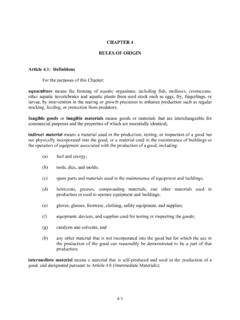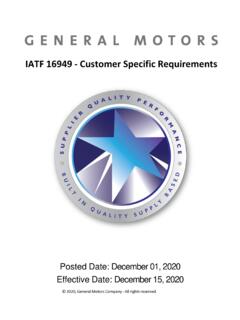Transcription of Automotive Sector - Canada's Competitive Advantages
1 PROFIT PERFORMANCE STABILITY PROFITPERFORMANCE INNOVATION DIVERSITYDIVERSITY STABILITY PROFIT PERFORMANCEINNOVATION PROFIT DIVERSITY STABILITYSTABILITY DIVERSITY INNOVATION PROFITPERFORMANCE STABITLITY PROFIT DIVERSITYPROFIT PERFORMANCE STABILITY PROFITPERFORMANCE INNOVATION DIVERSITYDIVERSITY STABILITY PROFIT PERFORMANCEINNOVATION PROFIT DIVERSITY STABILITYSTABILITY DIVERSITY INNOVATION PROFITPERFORMANCE STABITLITY PROFIT DIVERSITYINVEST INCANADA S Competitive ADVANTAGESAUTOMOTIVE SECTORCANADA S Automotive SECTORIN 2016, CANADA S Automotive MANUFACTURING INDUSTRY CONSISTED OF: 1,085 companies with 1,275 facilities20 passenger and commercial vehicle plants with million units of installed capacity800+ parts plantsannual production of million vehicles of which 85% were exported$ billion in factory revenuesAutomotive manufacturing is one of Canada s largest industrial sectors, accounting for 10% of manufacturing GDP and 23% of manufacturing trade.
2 Canada produces passenger vehicles, trucks and buses, auto parts and systems, truck bodies and trailers, as well as tires and machines-tools-dies-moulds (MTDM). The auto industry directly employs more than 125,000 people in vehicle assembly and auto parts manufacturing, and another 380,000 in distribution and aftermarket sales and manufacturing is highly concentrated in Ontario which accounts for 100% of Canada s light vehicle production, 400 parts manufacturers and 94% of industry shipments; however, there are also important manufacturing clusters in Quebec, Manitoba and British Columbia. CANADA S KEY STRENGTHS IN THE Automotive Sector Canada has the lowest cost structures and the lowest business tax burden among advanced economies, with an overall cost advantage of over the United States and over Japan in the Automotive manufacturing Sector . According to KPMG Competitive Alternatives, auto parts operations based in Canada typically enjoy a 31% labour cost advantage compared to their counterparts.
3 Canada s auto Sector is strategically located in the heart of the Great Lakes supercluster, which has the largest concentration of Automotive manufacturing and engineering/R&D centres in North America (45% of total vehicle production). There are 36 high-volume assembly plants within a 500-kilometre radius of the Windsor-Detroit border; these facilities built million vehicles in 2016. With more than 100 years as an auto-producing nation, Canada has an outstanding track record of performance and a well-established Automotive infrastructure that includes manufacturers and R&D expertise in materials, machinery, parts and finished vehicles. Canadian auto manufacturers are recognized for their strong capacity in launching complex and advanced Automotive manufacturing projects due to their world-class plant and labour quality. Canada is a global leader in emerging Automotive technologies such as lightweight materials, advanced safety systems, software and cybersecurity, connected/autonomous vehicles, artificial intelligence (AI), alternative powertrains (electric vehicles and fuel cells), vehicle safety and testing.
4 Companies such as Apple, ABB, Ford and General Motors have made significant recent investments in Canada to establish their R&D centers in self-driving vehicles, and are working closely with world-class universities engaged in cutting-edge research. Canada offers foreign investors excellent plant and labour quality, evidenced by the fact that Canadian assembly plants have won one-third of all Power plant quality awards for North America, which is nearly three times Canada s share of regional production. GM selected Canada for its clear capacity for innovation, proven talent and strong ecosystem of great universities, start-ups and innovative suppliers. Mark Reuss, Executive Vice President, Global Product Development, Purchasing and Supply Chain, General Motors COUMBIASASKATCHEWANALBERTAMANITOBAONTARI OQUEBECYUKONNUNAVUTNEWFOUNDLAND& LABRADORPRINCE EDWARD ISLANDNEWBRUNSWICKUNITED STATES OF AMERICAGREENLANDAALASK(USA)NOVASCOTIANOR THWEST TERRITORIESM ontr alOttawarToontoQu bec CityWinnipegSaskatoonCalgaryEdmontonVanc ouverNiagara HalifaxWaterlooLondonRECENT INVESTMENTSONTARIO: Vehicle assembly, original equipment parts, auto-related MTDM, AI and CV/AV tech Leading companies include.
5 Fiat Chrysler Autos, Ford, General Motors, Hino Motors, Honda, Toyota, ABC Group, AGS Automotive , Aisin Seiki, Anchor Danly, Autoliv, BlackBerry/QNX, Brose, Continental, Dana, Denso, D&V Electronics, Dynaplas, ETAS/ESCRYPT, Faurecia, Flex-N-Gate, Goodyear, HBPO, Husky Injection Molding, Hydrogenics, Intelligent Mechatronic Systems, Johnson Electric, KSR International, Laval Tool, Lear, Linamar, Magna International, Martinrea, Matcor Automotive , Mitchell Plastics, Multimatic, NARMCO Group, Nemak, Next AI, Nucap Industries, Papp Plastics, Schaeffler, Toyota Boshoku, TE Connectivity, Valiant TMS, Valeo, Vari-Form, Wescast Industries, Woodbridge Group, ZF/TRWAUTOMOTIVE CAPABILITY CLUSTERSMANITOBA: Buses, specialty vehicles, cold-weather testing Leading companies include: Motor Coach Industries, New Flyer, Artik/OEM, Carlson Composites, Champ Industries, Thompson UnlimitedBRITISH COLUMBIA: Fuel cell EV cluster Leading companies include: Automotive Fuel Cell Cooperation, Ballard Power, Canadian Autoparts Toyota, D-Wave, Loop Energy, Mercedes-Benz Fuel Cell Plant, Mojio, Powertech Labs, Westport InnovationsQUEBEC: Trucks, buses, light metals, electric vehicle (EV) components, AI and CV/AV tech Leading companies include: PACCAR (Kenworth, Peterbilt), Volvo Bus (Nova Bus, Pr vost), Blue Bird/Girardin, Lion Bus, ABB, Add nergie, Bollor Group, Bridgestone, Cooper-Standard, Element AI, Exo-S, Fluent AI, ImmerVision, LeddarTech, Phantom Intelligence, Raufoss Automotive , Spectra Premium, TM4, Toyoda Gosei, VerbomIn March 2017, Ford Motor Company unveiled a $ billion investment plan to transform its Windsor engine plant into a world class facility, and as well as creating hundreds of new R&D positions in Ontario to focus on connected/autonomous 2018, Linamar announced $500 million to.
6 Support the production of advanced engine and drivetrain components, develop and produce electrified and connected vehicle technology and create a dedicated innovation centre focussed on AI, machine learning and May 2016, Fiat Chrysler Autos (FCA) announced a $ billion investment to its Windsor assembly plant to produce the company s sixth generation of minivan, including a plug-in hybrid version of the October 2016, FCA announced $325 million to rebuild the paint shop in their Brampton, Ontario assembly January 2017, Honda announced a $492 million investment to upgrade its assembly plant in Alliston, Ontario to build the next generation of Civic and CR-V. In June 2016, General Motors announced a major expansion of its R&D team by 750 new engineers and software developers in Ontario, to focus on autonomous and connected vehicle software, controls development, safety, and S ADVANTAGESACCESS TO MAJOR MARKETS Under NAFTA, Canada enjoys preferential access to one of the largest and most important Automotive markets in the world.
7 With the Comprehensive Economic and Trade Agreement (CETA) with the European Union now in force, Canada has guaranteed preferential access to the European markets. In addition, Canada has a free trade agreement with South Korea, its first in Asia, providing a strategic gateway to this dynamic and fast-growing region. These trade agreements allow Automotive investors in Canada to benefit from integrated global supply chains and seize new export market SUPPLY BASE Canada s Automotive supply base is second to none, with capabilities in virtually every product category. Canadian suppliers are recognized for their best-in-class manufacturing expertise and innovation. Many of the largest global suppliers have operations in Canada and some of the biggest and most capable suppliers are based in Canada, including Magna International, Linamar, Bosch, Faurecia and Martinrea. Assemblers and Tier 1 suppliers in Canada also have access to value chains in the and SKILLED AND RELIABLE WORKFORCE Canada has a highly skilled workforce capable of providing a quality and productivity advantage vis- -vis lower cost jurisdictions.
8 Canadian workers in the auto industry are recognized for lower turnover and ability to problem solve on the shop floor. Also, Canadian workers are highly educated and reliable due to top quality education institutions that produce qualified graduates in engineering, machining, metalwork, welding, robotics, manufacturing systems, repairs and maintenance, and tool and die OF Automotive AND ICT EXPERTISE Canada s well-established strengths in Automotive manufacturing and information and communications technology (ICT) combine to make it an excellent to location to develop and build the connected, autonomous and safe vehicle of tomorrow. The Automotive and ICT clusters in Ontario and Quebec overlap perfectly, and provide a unique combination of manufacturing experience and software engineering expertise not even found in Silicon Valley. With recent investments by BlackBerry/QNX, Apple, Ford, Linamar and GM in autonomous driving research, Ontario is becoming an undeniable Automotive R&D hub.
9 Ontario s ICT cluster comprises over 19,000 firms and is second only to Silicon Valley in North America, with companies focusing on emerging Automotive technologies. The Greater Toronto area has the highest concentration of AI start-ups in the world. Automotive companies are tapping into a mature ICT Sector of 77,000 ICT workforce spread within 1,750 knowledge-based businesses including multinationals like Microsoft, Oracle, SAP, IBM and Greater Montreal Area is a vibrant heavy truck and bus manufacturing cluster, and is a global leader in the electrification of transportation, both for R&D and manufacturing. Quebec is the leading market for EVs with 46% of Canadian sales, and is investing to expand its charging station network. Montr al is a leading center of global AI and has the highest concentration of researchers and students of deep learning in the world with almost 9,000 students in AI and related programs. Montr al based researchers have used this expertise to develop cutting edge applications in the area of autonomous and connected investors in Canada s Automotive Sector are supported by a vibrant network of universities and research centres specializing in Automotive -related R&D.
10 In addition, companies that develop and test electronic systems and devices in Canada typically enjoy a cost advantage when compared to their has a strong track record of Automotive success with an experienced and collaborative federal and provincial government team that supports the Automotive offers generous investment tax credits and funding for Automotive companies investing in Canada: Scientific Research & Experimental Development (SR&ED) provides income tax credits and refunds for expenditures on eligible R&D activity in Canada on wages, materials, some overhead and SR&ED contracts. Strategic Innovation Fund (SIF) is a five-year $ billion program designed to support innovation activities across all industrial sectors, including Automotive . It provides loans or grants to support innovative R&D, technology transfer and commercialization projects, to attract large-scale investments, to facilitate company growth and expansion, and to encourage research collaborations and tech demonstration projects.










